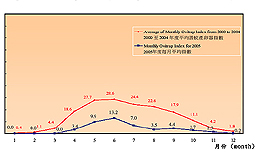
|
| Monitoring mosquitoes: Last year's monthly ovitrap indices (black) were lower than the those in 2000-04 (red). |
The monthly ovitrap indices last year were the lowest since the index's launch in 2000, the Health, Welfare & Food Bureau says.
The index reached its highest at 13.2% in June, much lower than the highest average of 28.6% in the past five years.
The port monthly ovitrap index throughout the year was also low, with the highest rating of 8.3% recorded in the railway cargo handling area in May and June.
Breeding elminated
Acting Deputy Secretary for Health, Welfare & Food Vincent Liu told lawmakers today the Food & Environmental Hygiene Department launched a Dengue vector surveillance programme in 2000 to monitor the distribution of Aedes albopictus at selected locations, to make timely adjustments to mosquito control strategies and measures.
Mr Liu said the programme was enhanced in 2003 by extending the coverage from 34 to 38 locations and the survey frequency was also raised from once every four months to a monthly basis.
Last year the department made about 580,000 inspections, and eliminated over 52,000 mosquito breeding places.
Between last October and October 2004, the department conducted a Hong Kong-wide Japanese encephalitis vector survey to map its distribution and detect its presence in local mosquitoes.
5 Yuen Long samples
The results revealed adults and larvae Culex tritaeniorhynchus were commonly found throughout the Hong Kong. Other potential vectors of JE were not detected.
Mr Liu said despite the wide availability of Culex tritaeniorhynchus, the detection of JE virus is uncommon. Only five out of the 180 batches of samples were found positive for the virus, all collected in Yuen Long where pig farms and migratory birds, which are known hosts of the disease, are commonly found.
The department has enhanced anti-mosquito action in these areas. The survey concluded that no parts of Hong Kong are considered to be high risk areas for the transmission of JE.
There were 31 imported Dengue fever cases reported last year, same as the year before. No local Dengue case was reported. The number of JE cases reduced from five local cases in 2004 to two cases - one local, one imported - in 2005.
2006 campaign
As for this year, Mr Liu said the anti-mosquito campaign will be implemented in three phases under the banner of 'Beware of JE and Dengue Fever. Act Now!':
* Phase 1: from February 27 February to March 25;
* Phase 2: from April 24 to June 30; and,
* Phase 3: from August 14 to October 7.
Control measures and publicity efforts will be stepped up during the campaign period, supplementing the regular inspection and enforcement work carried out by district pest control staff.
Special attention will be paid to areas in close proximity to residences, schools, construction sites, hospitals, illegal cultivation sites, waterfront public and private cargo working areas, boundary control points, typhoon shelters and piers.
|